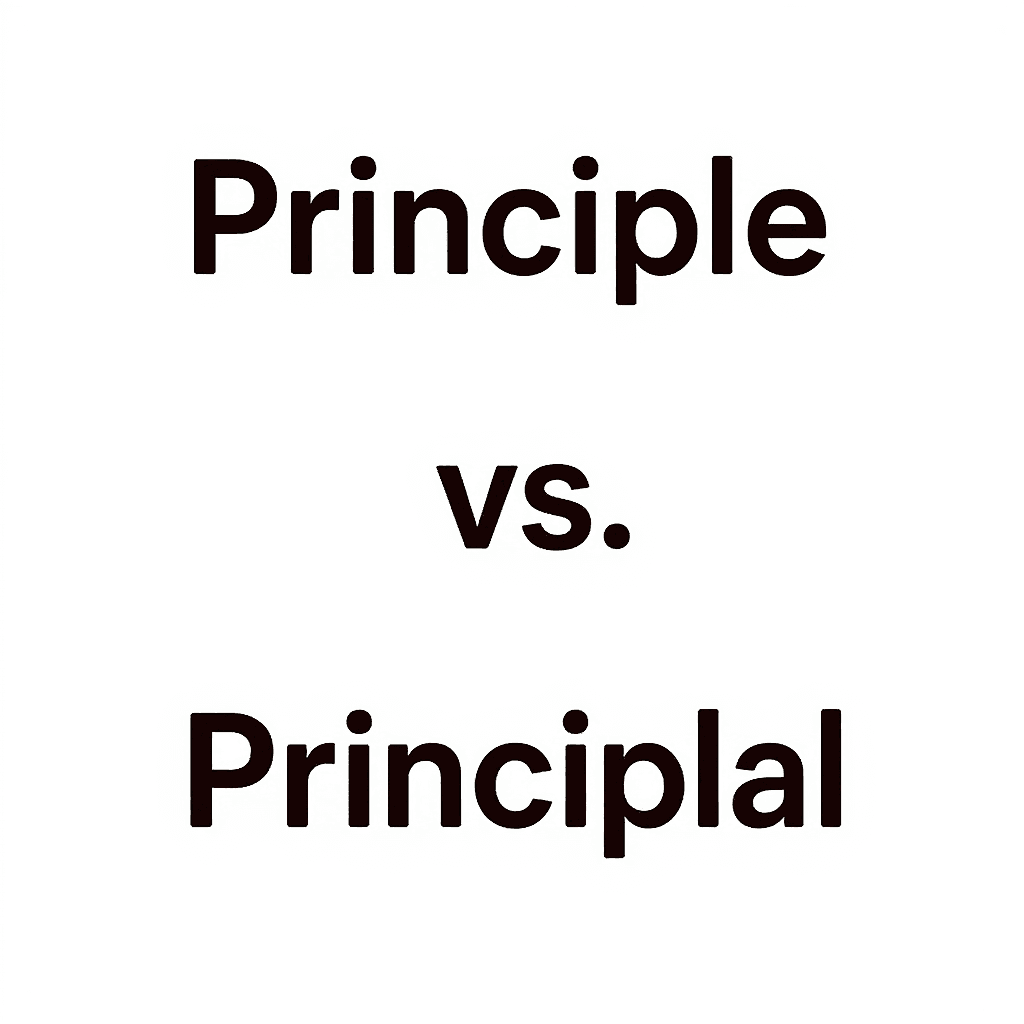“Principle” vs. “Principal”: What’s the Difference?
 The words principle and principal often cause confusion because they sound almost the same.
The words principle and principal often cause confusion because they sound almost the same.
But their meanings — and even their word types — are quite different.
Let’s break it down simply so you’ll never mix them up again.
Principle: A Rule or Belief
Meaning
“Principle” is a noun that means a basic rule, truth, or belief.
It refers to something you believe in or a fundamental law that guides actions.
Examples of “Principle” (10 total)
- Honesty is an important principle to live by.
- The company was founded on strong principles.
- She refused the offer on principle.
- It’s a matter of principle, not money.
- Newton’s laws describe the principles of motion.
- The school operates on sound educational principles.
- He always acts according to his moral principles.
- The principle of gravity applies everywhere.
- In science, every experiment tests a principle.
- Justice and fairness are guiding principles in our society.
🧠 Tip:
If you can replace the word with rule, belief, or law, use principle.
Principal: The Leader or Main Thing
Meaning
“Principal” can be both a noun and an adjective.
As a noun, it means:
- The person in charge (like a school principal)
- Or the main amount of money (in finance)
As an adjective, it means:
- Main, most important, or chief
Examples of “Principal” (10 total)
- The principal of the school gave a speech.
- She met with the principal investor.
- The principal reason I’m leaving is distance.
- Interest is charged on the principal loan amount.
- The principal dancer performed beautifully.
- He’s the principal architect of the project.
- Honesty is the principal virtue she values.
- The principal actor won an award.
- The principal aim of the project is efficiency.
- She paid back the principal plus interest.
🧠 Tip:
If it means “main” or “head person,” use principal.
Quick Comparison Table
| Word | Part of Speech | Meaning | Example |
|---|---|---|---|
| Principle | Noun | A basic rule, belief, or law | He stood by his principles. |
| Principal | Noun | Head person or main sum of money | The principal gave a speech. |
| Principal | Adjective | Main or most important | Honesty is the principal value here. |
How to Remember the Difference
👉 Principle = rule, law, or belief
👉 Principal = main person or thing
💡 Memory Trick:
Your principal is your “pal” — a person.
A principle is a rule — something you believe in.
Why This Matters in Writing
Mixing these up can change your meaning completely — for example:
“She’s a woman of strong principals” ❌
“She’s a woman of strong principles” ✅
Even advanced AI tools sometimes confuse the two.
That’s why Humanizey helps polish AI-generated text by fixing word-choice errors and ensuring your writing sounds natural and correct.
FAQs
1. Can “principal” and “principle” ever mean the same thing?
No. Principal refers to a person or main thing; principle refers to a belief or rule.
2. How can I tell which one to use quickly?
If it’s a person or main reason, use principal.
If it’s a belief or rule, use principle.
3. What does “on principle” mean?
It means doing something because it’s morally or ethically right, not for personal gain.
4. What’s the plural of each?
Principles (rules) and principals (people or things).
Practice: Choose the Correct Word (“Principle” or “Principal”)
(Answers are listed at the end.)
- The school’s ___ announced a new policy.
- He refused the offer on ___.
- The ___ reason for success is hard work.
- Honesty is a basic moral ___.
- The loan’s ___ must be repaid in full.
- She’s one of the ___ investors in the company.
- The experiment demonstrates an important scientific ___.
- The ___ aim of the campaign is awareness.
- He never breaks his core ___.
- The bank charges interest on both the ___ and the fees.
Answers
- principal
- principle
- principal
- principle
- principal
- principal
- principle
- principal
- principles
- principal
